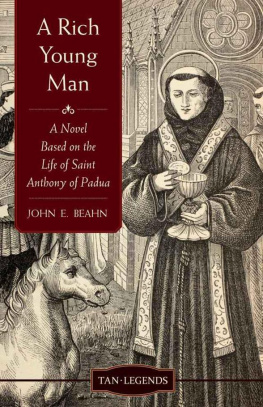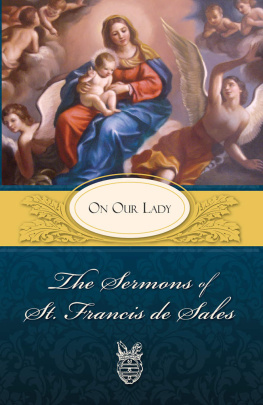
Other titles by John E. Beahn in the TAN Legends Series
A MAN CLEANSED BY GOD
A Novel Based on the Life of Saint Patrick
A MAN BORN AGAIN
A Novel Based on the Life of Saint Thomas More
A RICH YOUNG MAN
A Novel Based on the Life of Saint Anthony of Padua

This book was first published in 1958 by The Newman Press in Westminster, Maryland, under the title A Man of Good Zeal: A Biographical Novel Based on the Life of St. Francis de Sales . This TAN Legends edition has been re-typeset and revised to include corrections of typographical errors and updating of punctuation, spelling and diction.
TAN Legends edition copyright 2013 TAN Books.
All rights reserved. With the exception of short excerpts used in articles and critical reviews, no part of this work may be reproduced, transmitted, or stored in any form whatsoever, printed or electronic, without the prior written permission of the publisher.
Acknowledgement from the original edition: The publisher and author acknowledge with thanks permission to quote from the Life of St. Frances de Sales , by the Rev. Harold Burton, published by P. J. Kenedy & Sons, New York.
Cover design by Caroline Kiser.
ISBN: 978-1-61890-205-4
Cataloging-in-Publication data on file with the Library of Congress.
Printed and bound in the United States of America.
TAN Books
Charlotte, North Carolina
www.TANBooks.com
2013
To the memory of my uncle and good friend
John F. Mcfadden
Now it came to pass, when the days had come for Him to be taken up, that He steadfastly set His face to go to Jerusalem, and sent messengers before Him. And they went and entered a Samaritan town to make ready for Him; and they did not receive Him, because His face was set for Jerusalem. But when His disciples, James and John, saw this, they said, Lord, wilt Thou that we bid fire come down from heaven and consume them?
But He turned and rebuked them, saying, You do not know of what manner of spirit you are: for the Son of Man did not come to destroy mens lives, but to save them. And they went to another village.
Luke 9:5156
CONTENTS
PROLOGUE
M ANY who knew my cousin, Francis, being desirous of retaining him with them longer than life permitted, have asked that I record his history. Let it be said that their importunities attest more their love for him than respect for me, for I have never demonstrated aptitude for such a work. I have practiced the art of writing only by composition of those letters required of me as secretary to Francis.
When first urged to this task, immediately after his death, I excused myself and, in so doing, conveyed unwittingly the impression that I could not bear the added sorrow of recalling my many years of intimate companionship with him. The truth is that my love for him was a greater incentive than the requests of others, and I had begun, long before his death, to recall and record events and circumstances of his life.
In the course of these labors, however, I became aware that his visible achievements, great as they were, became insignificant when compared with his invisible and interior achievements. True, his external life would inspire and edify all who wish to imitate his prodigious efforts for the glory of God, the glory of Gods Church, and the salvation of souls; but these would necessarily be the few whom God might bless with talent equalling his. His invisible and interior achievements, on the contrary, marked his progress toward the true goal of his life; more important, all can imitate themprince, peasant, rich, poor, clergy, laity.
During this mortal life, Francis wrote in the final chapter of his Treatise on the Love of God , we must choose eternal love or eternal death; there is no middle choice. O Eternal Love, my soul desires and chooses Thee eternally! This was his choice, this his goal; and I determined that my history must record his progress toward it even while recounting the external incidents of his life.
Presumptuous?
I will admit the charge. Mans life, wrote St. Thomas Aquinas, is exterior and interior. His exterior life is concerned with sensitive and corporeal nature, not with God or the angels. His interior life is concerned with intellectual and spiritual life and, thus, with God and the angels. But a man is competent to judge only of the exterior actions of another while God alone can know interior movements and affections.
Were I motivated by mere curiosity or, worse, that vanity which examines others to their detriment, I should proceed no further; but I view Francis interior life, to such extent as I can penetrate it, as a model for myself and all others. I see, in this material which I have compiled, evidences of progress toward the Eternal Loveprogress that entailed the surmounting of many obstacles, conquering of many temptations, correcting of many mistakes, as such progress will be marked in the life of any who seek the same goal.
My evidence is necessarily incomplete; but where it fails, I shall resort to probability founded on the writings of many holy men who have pointed the path toward heaven, firmly believing that, as we form the science of sanctity from examination of many saintly lives, so may we apply the principles of this science when necessary to illuminate aspects of a particular life.
I do not wish to anticipate nor to oppose judgment by the Church. When I finish the work, I shall entrust it to a monastery for such disposition as the abbot or his successors may decide. If the many petitions now directed to Rome should prompt examination into the holiness of Francis life, this work may contribute something to final decision; but should there be no investigation, this work may well remain hidden or be destroyed. Only if Holy Mother Church infallibly decrees the sanctity of Francis may this work be revealed to the world.
Another consideration increases my caution. The work necessitates revealing or emphasizing incidents which certain individuals would prefer be concealed. I could not cause them pain or embarrassment; for I am mindful of Francis unfailing consideration for the sentiments of others and will not dishonor his memory by violating his principles. To my knowledge, all whose names shall appear are now dead; but some of their relations and descendants might be dismayed by disclosures pertaining to their ancestors. Therefore, I enjoin those entrusted with this manuscript to withhold it from publication until the years shall minimize all possibility of offense, though I leave to their wisdom and good will the decision as to an appropriate time.
Conceivably, many years may intervene between composition and publication of this work; readers far removed by time or space may be puzzled by conditions and circumstances in an obscure corner of Europe, references to a country daily threatened with extinction, and events hardly noticed in their own time because of much greater events occurring elsewhere. Since I must write my account of Francis for readers presently acquainted with current affairs, I shall offer a short explanation for the information of others.
Our country of Savoy borders on France. It extends from the shore of Lake Geneva, southward across the Alps, includes the district of Piedmont in Italy, and ends on the shore of the Mediterranean at Nice. Our sovereign, the Duke, maintains his principal home in Turin, Italy, and a lesser home at Chambery in the country north of the Alps.
At one time, the city of Geneva was part of Savoy; but in 1534, Genevans engaged in dispute with both their resident bishop and the distant Duke. They caused the bishop to move to Annecy, some twenty-two miles southward, which remains the site of his residence, and declared their independence of the Duke.
Next page






![Saint Francis de Sales [Sales - The Saint Francis de Sales Collection [15 Books]](/uploads/posts/book/266802/thumbs/saint-francis-de-sales-sales-the-saint-francis.jpg)



![Saint Francis de Sales - The Saint Francis de Sales Collection [15 Books]](/uploads/posts/book/161144/thumbs/saint-francis-de-sales-the-saint-francis-de-sales.jpg)

